Nurses' Well-being and Work Environment
VerifiedAdded on 2020/05/04
|13
|3766
|83
AI Summary
This assignment delves into the challenges faced by nurses regarding stress and burnout. It examines the role of emotional intelligence in coping with these pressures, highlighting the importance of mentorship programs for professional growth and support. Furthermore, it analyzes the influence of surgical attire, hand hygiene practices, and adherence to protocols on infection control and patient safety.
Contribute Materials
Your contribution can guide someone’s learning journey. Share your
documents today.
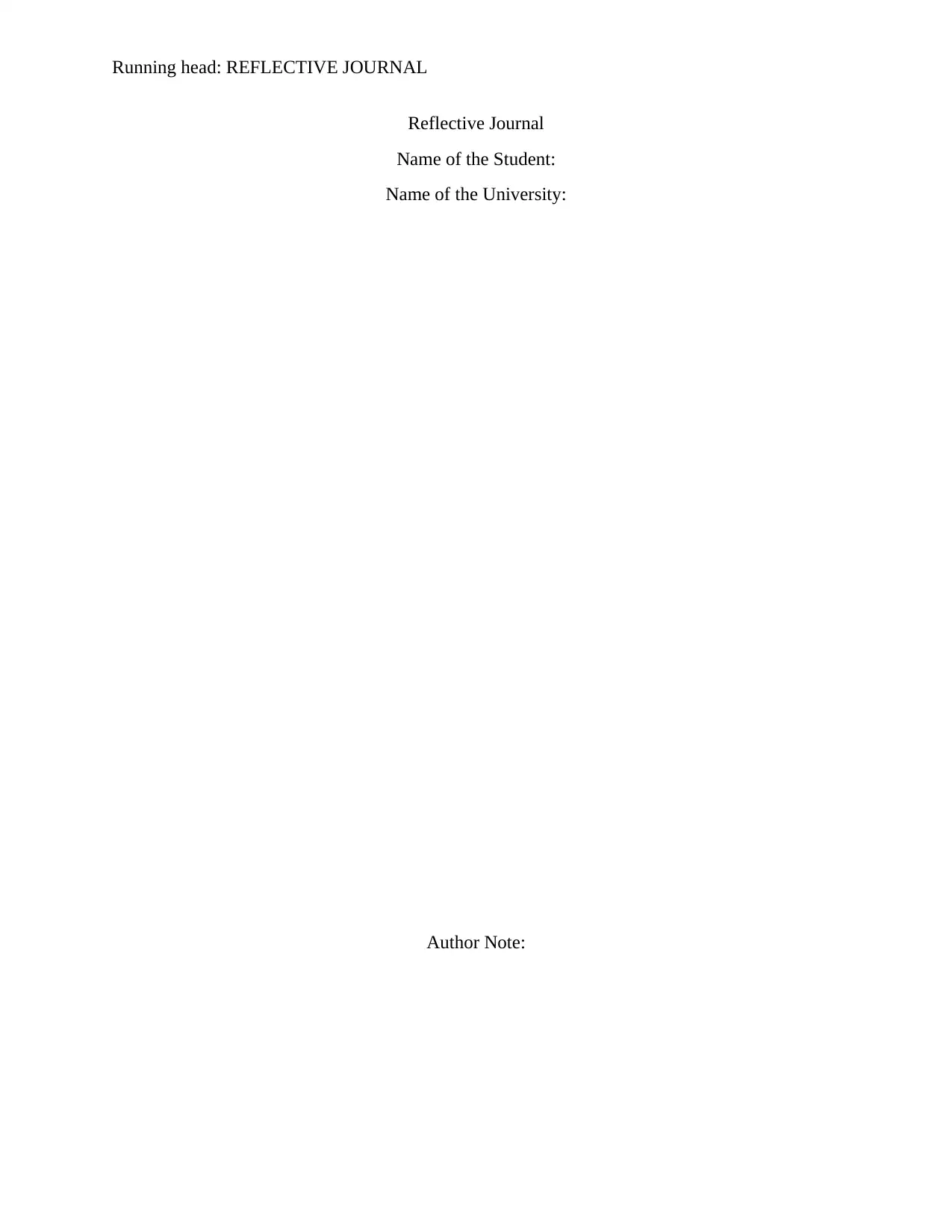
Running head: REFLECTIVE JOURNAL
Reflective Journal
Name of the Student:
Name of the University:
Author Note:
Reflective Journal
Name of the Student:
Name of the University:
Author Note:
Secure Best Marks with AI Grader
Need help grading? Try our AI Grader for instant feedback on your assignments.
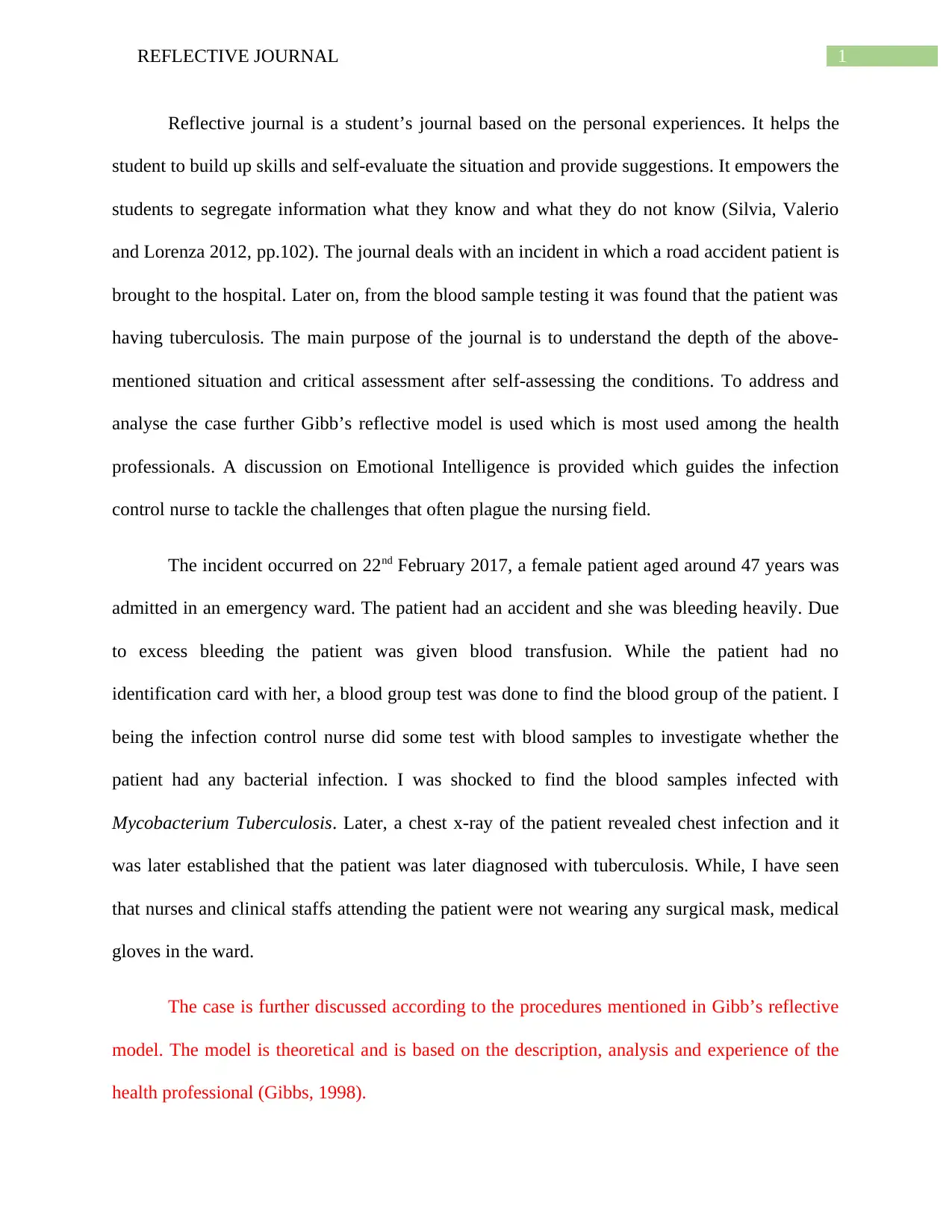
1REFLECTIVE JOURNAL
Reflective journal is a student’s journal based on the personal experiences. It helps the
student to build up skills and self-evaluate the situation and provide suggestions. It empowers the
students to segregate information what they know and what they do not know (Silvia, Valerio
and Lorenza 2012, pp.102). The journal deals with an incident in which a road accident patient is
brought to the hospital. Later on, from the blood sample testing it was found that the patient was
having tuberculosis. The main purpose of the journal is to understand the depth of the above-
mentioned situation and critical assessment after self-assessing the conditions. To address and
analyse the case further Gibb’s reflective model is used which is most used among the health
professionals. A discussion on Emotional Intelligence is provided which guides the infection
control nurse to tackle the challenges that often plague the nursing field.
The incident occurred on 22nd February 2017, a female patient aged around 47 years was
admitted in an emergency ward. The patient had an accident and she was bleeding heavily. Due
to excess bleeding the patient was given blood transfusion. While the patient had no
identification card with her, a blood group test was done to find the blood group of the patient. I
being the infection control nurse did some test with blood samples to investigate whether the
patient had any bacterial infection. I was shocked to find the blood samples infected with
Mycobacterium Tuberculosis. Later, a chest x-ray of the patient revealed chest infection and it
was later established that the patient was later diagnosed with tuberculosis. While, I have seen
that nurses and clinical staffs attending the patient were not wearing any surgical mask, medical
gloves in the ward.
The case is further discussed according to the procedures mentioned in Gibb’s reflective
model. The model is theoretical and is based on the description, analysis and experience of the
health professional (Gibbs, 1998).
Reflective journal is a student’s journal based on the personal experiences. It helps the
student to build up skills and self-evaluate the situation and provide suggestions. It empowers the
students to segregate information what they know and what they do not know (Silvia, Valerio
and Lorenza 2012, pp.102). The journal deals with an incident in which a road accident patient is
brought to the hospital. Later on, from the blood sample testing it was found that the patient was
having tuberculosis. The main purpose of the journal is to understand the depth of the above-
mentioned situation and critical assessment after self-assessing the conditions. To address and
analyse the case further Gibb’s reflective model is used which is most used among the health
professionals. A discussion on Emotional Intelligence is provided which guides the infection
control nurse to tackle the challenges that often plague the nursing field.
The incident occurred on 22nd February 2017, a female patient aged around 47 years was
admitted in an emergency ward. The patient had an accident and she was bleeding heavily. Due
to excess bleeding the patient was given blood transfusion. While the patient had no
identification card with her, a blood group test was done to find the blood group of the patient. I
being the infection control nurse did some test with blood samples to investigate whether the
patient had any bacterial infection. I was shocked to find the blood samples infected with
Mycobacterium Tuberculosis. Later, a chest x-ray of the patient revealed chest infection and it
was later established that the patient was later diagnosed with tuberculosis. While, I have seen
that nurses and clinical staffs attending the patient were not wearing any surgical mask, medical
gloves in the ward.
The case is further discussed according to the procedures mentioned in Gibb’s reflective
model. The model is theoretical and is based on the description, analysis and experience of the
health professional (Gibbs, 1998).
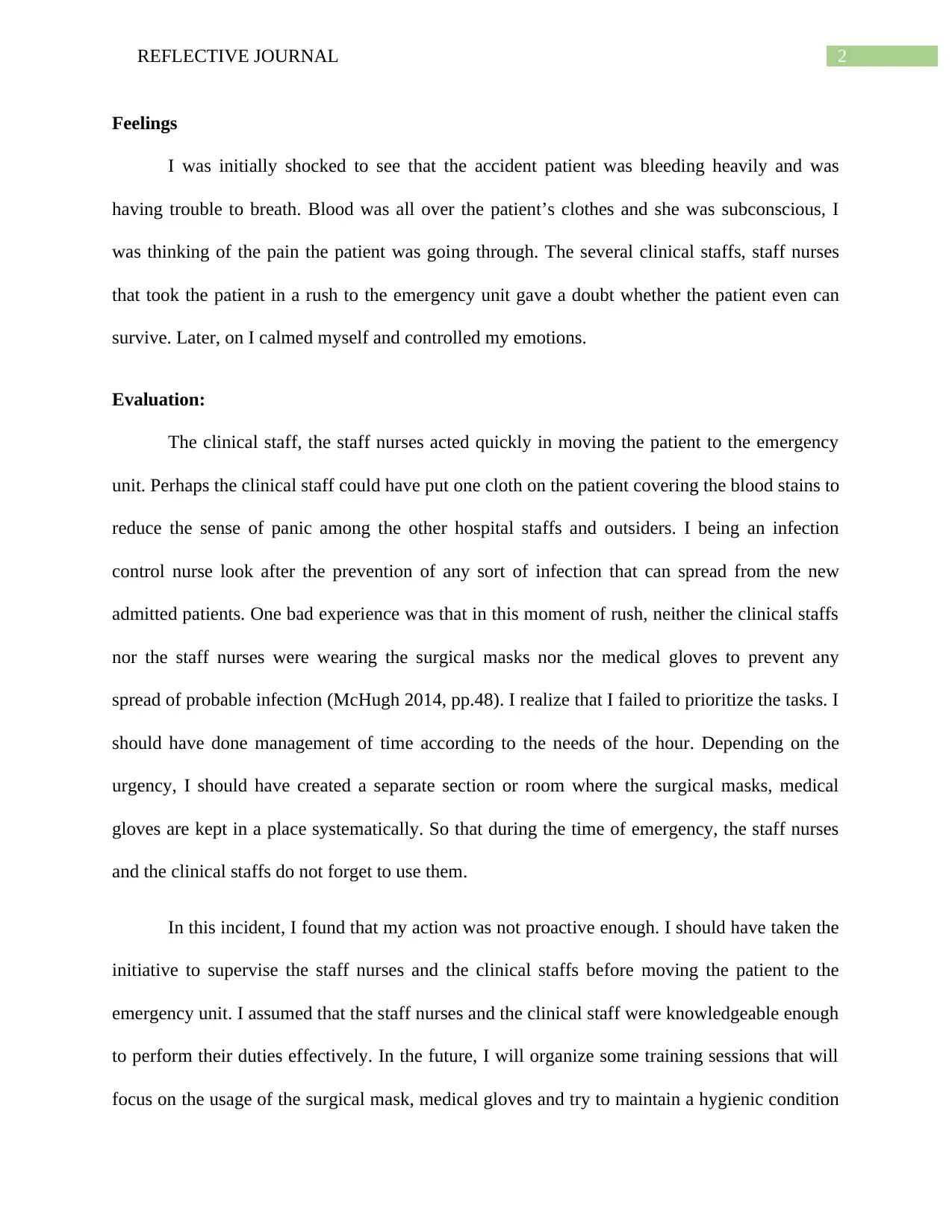
2REFLECTIVE JOURNAL
Feelings
I was initially shocked to see that the accident patient was bleeding heavily and was
having trouble to breath. Blood was all over the patient’s clothes and she was subconscious, I
was thinking of the pain the patient was going through. The several clinical staffs, staff nurses
that took the patient in a rush to the emergency unit gave a doubt whether the patient even can
survive. Later, on I calmed myself and controlled my emotions.
Evaluation:
The clinical staff, the staff nurses acted quickly in moving the patient to the emergency
unit. Perhaps the clinical staff could have put one cloth on the patient covering the blood stains to
reduce the sense of panic among the other hospital staffs and outsiders. I being an infection
control nurse look after the prevention of any sort of infection that can spread from the new
admitted patients. One bad experience was that in this moment of rush, neither the clinical staffs
nor the staff nurses were wearing the surgical masks nor the medical gloves to prevent any
spread of probable infection (McHugh 2014, pp.48). I realize that I failed to prioritize the tasks. I
should have done management of time according to the needs of the hour. Depending on the
urgency, I should have created a separate section or room where the surgical masks, medical
gloves are kept in a place systematically. So that during the time of emergency, the staff nurses
and the clinical staffs do not forget to use them.
In this incident, I found that my action was not proactive enough. I should have taken the
initiative to supervise the staff nurses and the clinical staffs before moving the patient to the
emergency unit. I assumed that the staff nurses and the clinical staff were knowledgeable enough
to perform their duties effectively. In the future, I will organize some training sessions that will
focus on the usage of the surgical mask, medical gloves and try to maintain a hygienic condition
Feelings
I was initially shocked to see that the accident patient was bleeding heavily and was
having trouble to breath. Blood was all over the patient’s clothes and she was subconscious, I
was thinking of the pain the patient was going through. The several clinical staffs, staff nurses
that took the patient in a rush to the emergency unit gave a doubt whether the patient even can
survive. Later, on I calmed myself and controlled my emotions.
Evaluation:
The clinical staff, the staff nurses acted quickly in moving the patient to the emergency
unit. Perhaps the clinical staff could have put one cloth on the patient covering the blood stains to
reduce the sense of panic among the other hospital staffs and outsiders. I being an infection
control nurse look after the prevention of any sort of infection that can spread from the new
admitted patients. One bad experience was that in this moment of rush, neither the clinical staffs
nor the staff nurses were wearing the surgical masks nor the medical gloves to prevent any
spread of probable infection (McHugh 2014, pp.48). I realize that I failed to prioritize the tasks. I
should have done management of time according to the needs of the hour. Depending on the
urgency, I should have created a separate section or room where the surgical masks, medical
gloves are kept in a place systematically. So that during the time of emergency, the staff nurses
and the clinical staffs do not forget to use them.
In this incident, I found that my action was not proactive enough. I should have taken the
initiative to supervise the staff nurses and the clinical staffs before moving the patient to the
emergency unit. I assumed that the staff nurses and the clinical staff were knowledgeable enough
to perform their duties effectively. In the future, I will organize some training sessions that will
focus on the usage of the surgical mask, medical gloves and try to maintain a hygienic condition
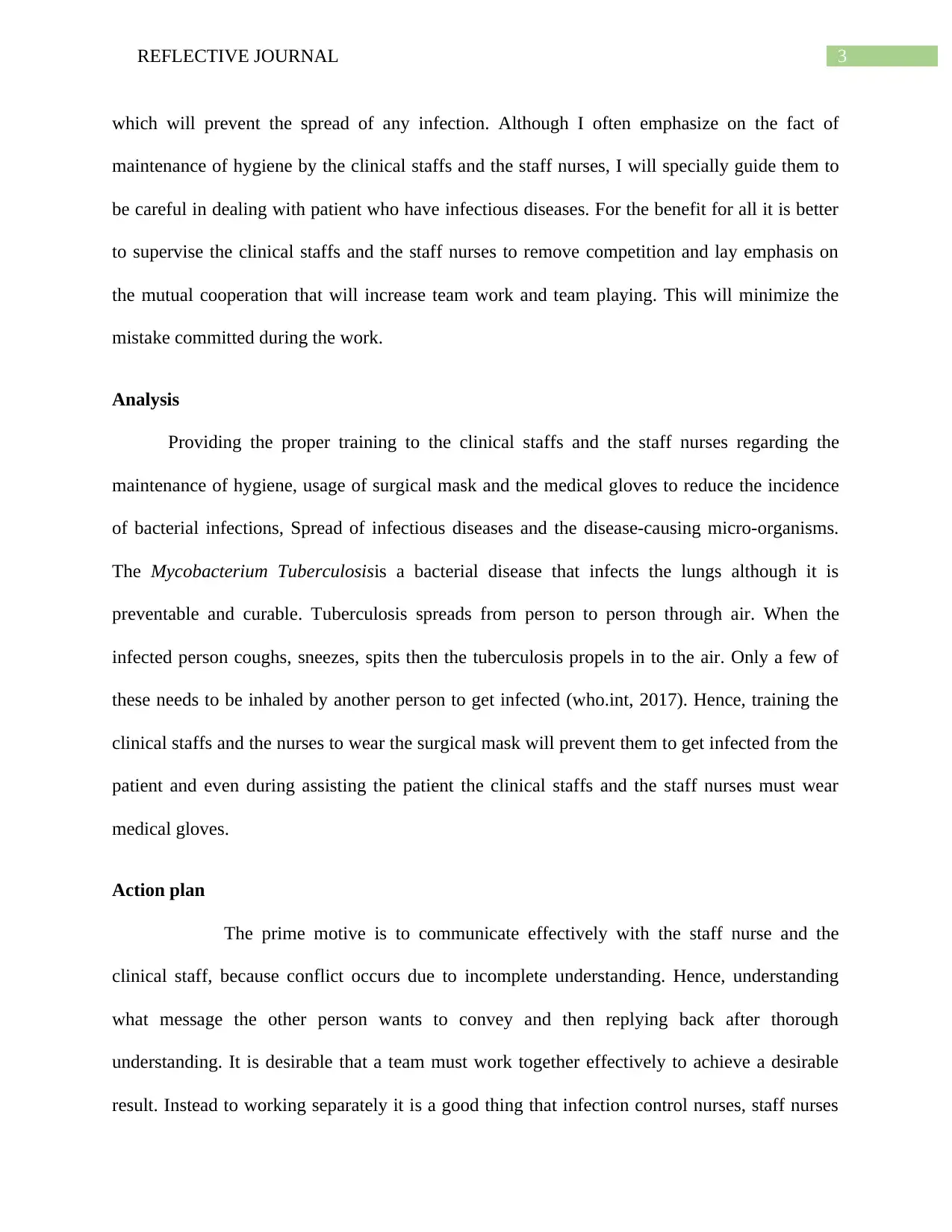
3REFLECTIVE JOURNAL
which will prevent the spread of any infection. Although I often emphasize on the fact of
maintenance of hygiene by the clinical staffs and the staff nurses, I will specially guide them to
be careful in dealing with patient who have infectious diseases. For the benefit for all it is better
to supervise the clinical staffs and the staff nurses to remove competition and lay emphasis on
the mutual cooperation that will increase team work and team playing. This will minimize the
mistake committed during the work.
Analysis
Providing the proper training to the clinical staffs and the staff nurses regarding the
maintenance of hygiene, usage of surgical mask and the medical gloves to reduce the incidence
of bacterial infections, Spread of infectious diseases and the disease-causing micro-organisms.
The Mycobacterium Tuberculosisis a bacterial disease that infects the lungs although it is
preventable and curable. Tuberculosis spreads from person to person through air. When the
infected person coughs, sneezes, spits then the tuberculosis propels in to the air. Only a few of
these needs to be inhaled by another person to get infected (who.int, 2017). Hence, training the
clinical staffs and the nurses to wear the surgical mask will prevent them to get infected from the
patient and even during assisting the patient the clinical staffs and the staff nurses must wear
medical gloves.
Action plan
The prime motive is to communicate effectively with the staff nurse and the
clinical staff, because conflict occurs due to incomplete understanding. Hence, understanding
what message the other person wants to convey and then replying back after thorough
understanding. It is desirable that a team must work together effectively to achieve a desirable
result. Instead to working separately it is a good thing that infection control nurses, staff nurses
which will prevent the spread of any infection. Although I often emphasize on the fact of
maintenance of hygiene by the clinical staffs and the staff nurses, I will specially guide them to
be careful in dealing with patient who have infectious diseases. For the benefit for all it is better
to supervise the clinical staffs and the staff nurses to remove competition and lay emphasis on
the mutual cooperation that will increase team work and team playing. This will minimize the
mistake committed during the work.
Analysis
Providing the proper training to the clinical staffs and the staff nurses regarding the
maintenance of hygiene, usage of surgical mask and the medical gloves to reduce the incidence
of bacterial infections, Spread of infectious diseases and the disease-causing micro-organisms.
The Mycobacterium Tuberculosisis a bacterial disease that infects the lungs although it is
preventable and curable. Tuberculosis spreads from person to person through air. When the
infected person coughs, sneezes, spits then the tuberculosis propels in to the air. Only a few of
these needs to be inhaled by another person to get infected (who.int, 2017). Hence, training the
clinical staffs and the nurses to wear the surgical mask will prevent them to get infected from the
patient and even during assisting the patient the clinical staffs and the staff nurses must wear
medical gloves.
Action plan
The prime motive is to communicate effectively with the staff nurse and the
clinical staff, because conflict occurs due to incomplete understanding. Hence, understanding
what message the other person wants to convey and then replying back after thorough
understanding. It is desirable that a team must work together effectively to achieve a desirable
result. Instead to working separately it is a good thing that infection control nurses, staff nurses
Secure Best Marks with AI Grader
Need help grading? Try our AI Grader for instant feedback on your assignments.
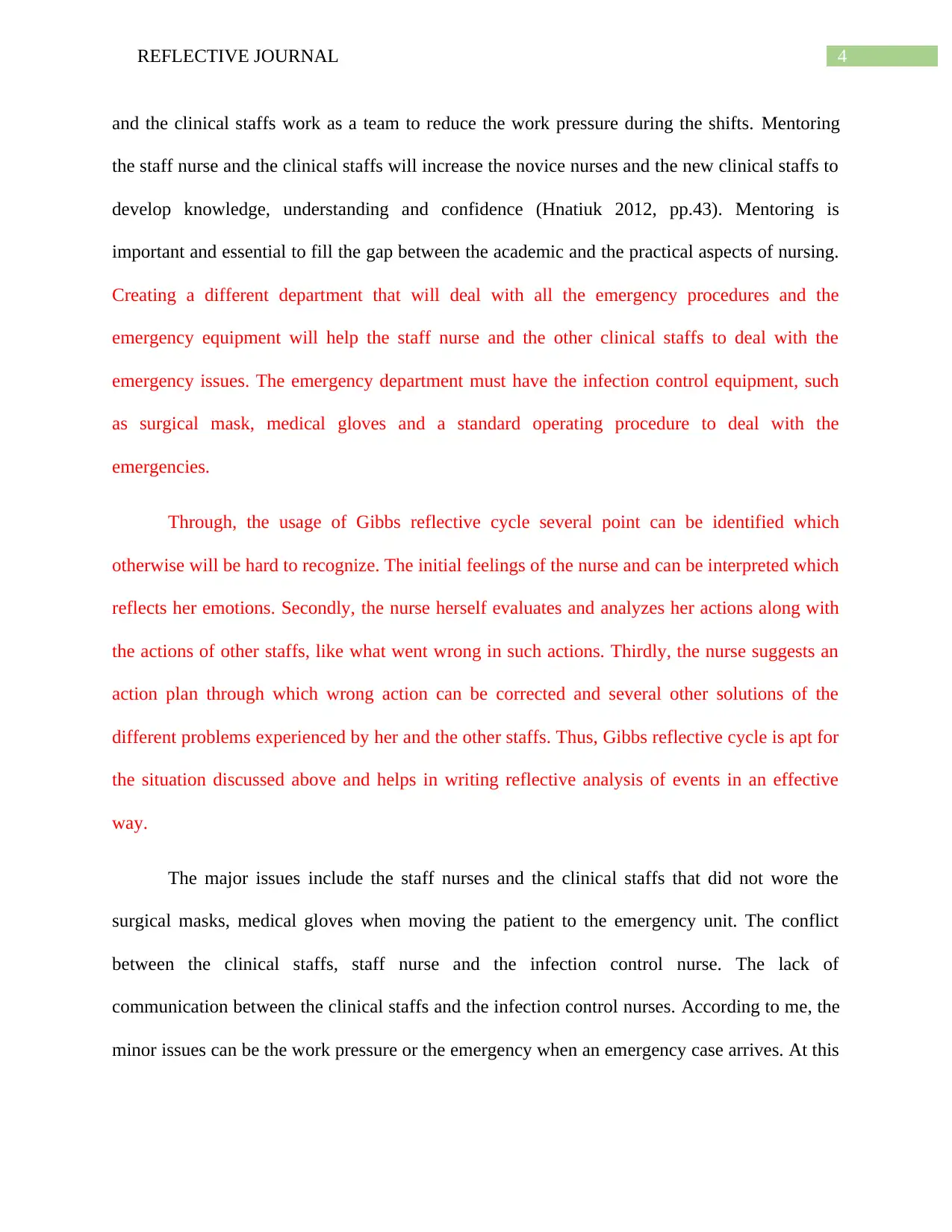
4REFLECTIVE JOURNAL
and the clinical staffs work as a team to reduce the work pressure during the shifts. Mentoring
the staff nurse and the clinical staffs will increase the novice nurses and the new clinical staffs to
develop knowledge, understanding and confidence (Hnatiuk 2012, pp.43). Mentoring is
important and essential to fill the gap between the academic and the practical aspects of nursing.
Creating a different department that will deal with all the emergency procedures and the
emergency equipment will help the staff nurse and the other clinical staffs to deal with the
emergency issues. The emergency department must have the infection control equipment, such
as surgical mask, medical gloves and a standard operating procedure to deal with the
emergencies.
Through, the usage of Gibbs reflective cycle several point can be identified which
otherwise will be hard to recognize. The initial feelings of the nurse and can be interpreted which
reflects her emotions. Secondly, the nurse herself evaluates and analyzes her actions along with
the actions of other staffs, like what went wrong in such actions. Thirdly, the nurse suggests an
action plan through which wrong action can be corrected and several other solutions of the
different problems experienced by her and the other staffs. Thus, Gibbs reflective cycle is apt for
the situation discussed above and helps in writing reflective analysis of events in an effective
way.
The major issues include the staff nurses and the clinical staffs that did not wore the
surgical masks, medical gloves when moving the patient to the emergency unit. The conflict
between the clinical staffs, staff nurse and the infection control nurse. The lack of
communication between the clinical staffs and the infection control nurses. According to me, the
minor issues can be the work pressure or the emergency when an emergency case arrives. At this
and the clinical staffs work as a team to reduce the work pressure during the shifts. Mentoring
the staff nurse and the clinical staffs will increase the novice nurses and the new clinical staffs to
develop knowledge, understanding and confidence (Hnatiuk 2012, pp.43). Mentoring is
important and essential to fill the gap between the academic and the practical aspects of nursing.
Creating a different department that will deal with all the emergency procedures and the
emergency equipment will help the staff nurse and the other clinical staffs to deal with the
emergency issues. The emergency department must have the infection control equipment, such
as surgical mask, medical gloves and a standard operating procedure to deal with the
emergencies.
Through, the usage of Gibbs reflective cycle several point can be identified which
otherwise will be hard to recognize. The initial feelings of the nurse and can be interpreted which
reflects her emotions. Secondly, the nurse herself evaluates and analyzes her actions along with
the actions of other staffs, like what went wrong in such actions. Thirdly, the nurse suggests an
action plan through which wrong action can be corrected and several other solutions of the
different problems experienced by her and the other staffs. Thus, Gibbs reflective cycle is apt for
the situation discussed above and helps in writing reflective analysis of events in an effective
way.
The major issues include the staff nurses and the clinical staffs that did not wore the
surgical masks, medical gloves when moving the patient to the emergency unit. The conflict
between the clinical staffs, staff nurse and the infection control nurse. The lack of
communication between the clinical staffs and the infection control nurses. According to me, the
minor issues can be the work pressure or the emergency when an emergency case arrives. At this
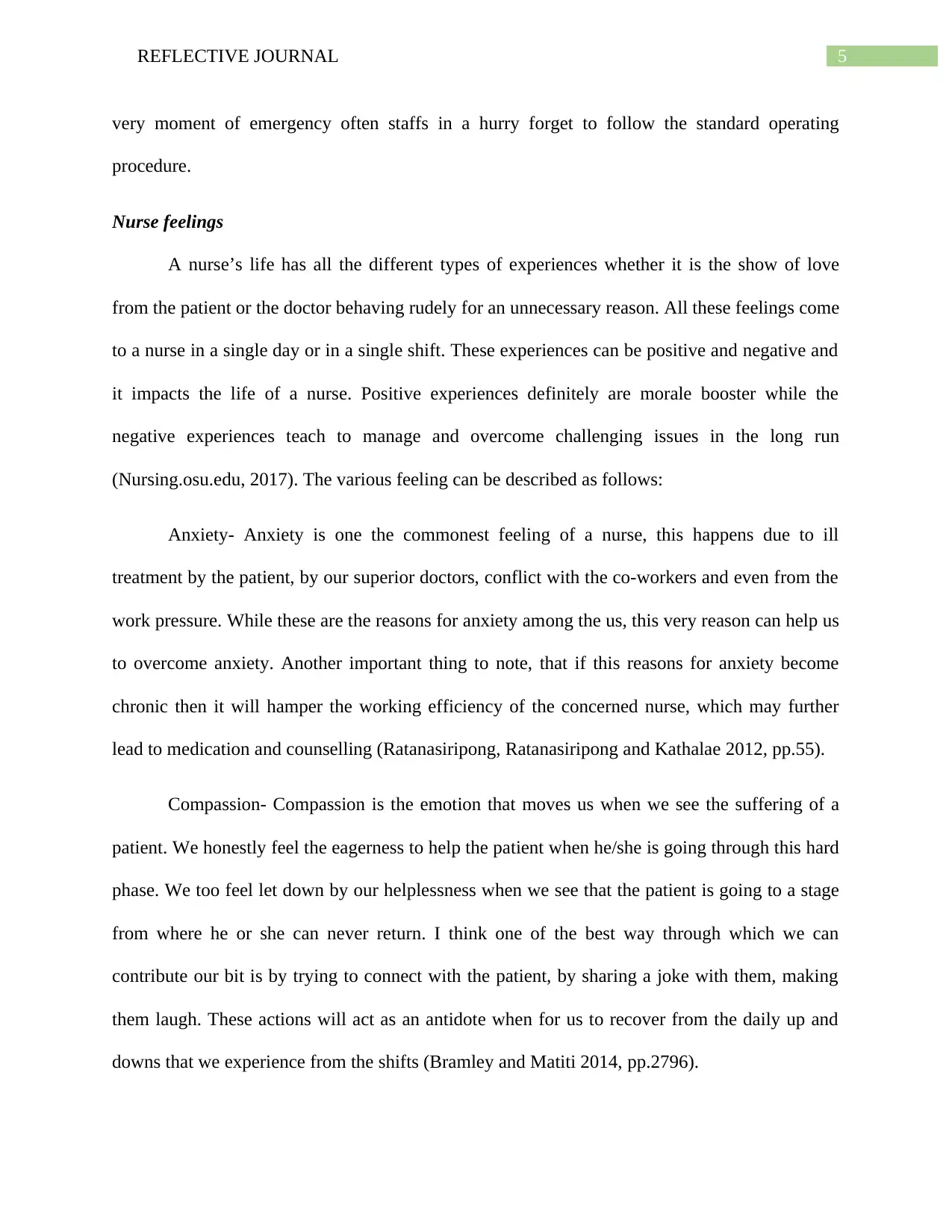
5REFLECTIVE JOURNAL
very moment of emergency often staffs in a hurry forget to follow the standard operating
procedure.
Nurse feelings
A nurse’s life has all the different types of experiences whether it is the show of love
from the patient or the doctor behaving rudely for an unnecessary reason. All these feelings come
to a nurse in a single day or in a single shift. These experiences can be positive and negative and
it impacts the life of a nurse. Positive experiences definitely are morale booster while the
negative experiences teach to manage and overcome challenging issues in the long run
(Nursing.osu.edu, 2017). The various feeling can be described as follows:
Anxiety- Anxiety is one the commonest feeling of a nurse, this happens due to ill
treatment by the patient, by our superior doctors, conflict with the co-workers and even from the
work pressure. While these are the reasons for anxiety among the us, this very reason can help us
to overcome anxiety. Another important thing to note, that if this reasons for anxiety become
chronic then it will hamper the working efficiency of the concerned nurse, which may further
lead to medication and counselling (Ratanasiripong, Ratanasiripong and Kathalae 2012, pp.55).
Compassion- Compassion is the emotion that moves us when we see the suffering of a
patient. We honestly feel the eagerness to help the patient when he/she is going through this hard
phase. We too feel let down by our helplessness when we see that the patient is going to a stage
from where he or she can never return. I think one of the best way through which we can
contribute our bit is by trying to connect with the patient, by sharing a joke with them, making
them laugh. These actions will act as an antidote when for us to recover from the daily up and
downs that we experience from the shifts (Bramley and Matiti 2014, pp.2796).
very moment of emergency often staffs in a hurry forget to follow the standard operating
procedure.
Nurse feelings
A nurse’s life has all the different types of experiences whether it is the show of love
from the patient or the doctor behaving rudely for an unnecessary reason. All these feelings come
to a nurse in a single day or in a single shift. These experiences can be positive and negative and
it impacts the life of a nurse. Positive experiences definitely are morale booster while the
negative experiences teach to manage and overcome challenging issues in the long run
(Nursing.osu.edu, 2017). The various feeling can be described as follows:
Anxiety- Anxiety is one the commonest feeling of a nurse, this happens due to ill
treatment by the patient, by our superior doctors, conflict with the co-workers and even from the
work pressure. While these are the reasons for anxiety among the us, this very reason can help us
to overcome anxiety. Another important thing to note, that if this reasons for anxiety become
chronic then it will hamper the working efficiency of the concerned nurse, which may further
lead to medication and counselling (Ratanasiripong, Ratanasiripong and Kathalae 2012, pp.55).
Compassion- Compassion is the emotion that moves us when we see the suffering of a
patient. We honestly feel the eagerness to help the patient when he/she is going through this hard
phase. We too feel let down by our helplessness when we see that the patient is going to a stage
from where he or she can never return. I think one of the best way through which we can
contribute our bit is by trying to connect with the patient, by sharing a joke with them, making
them laugh. These actions will act as an antidote when for us to recover from the daily up and
downs that we experience from the shifts (Bramley and Matiti 2014, pp.2796).
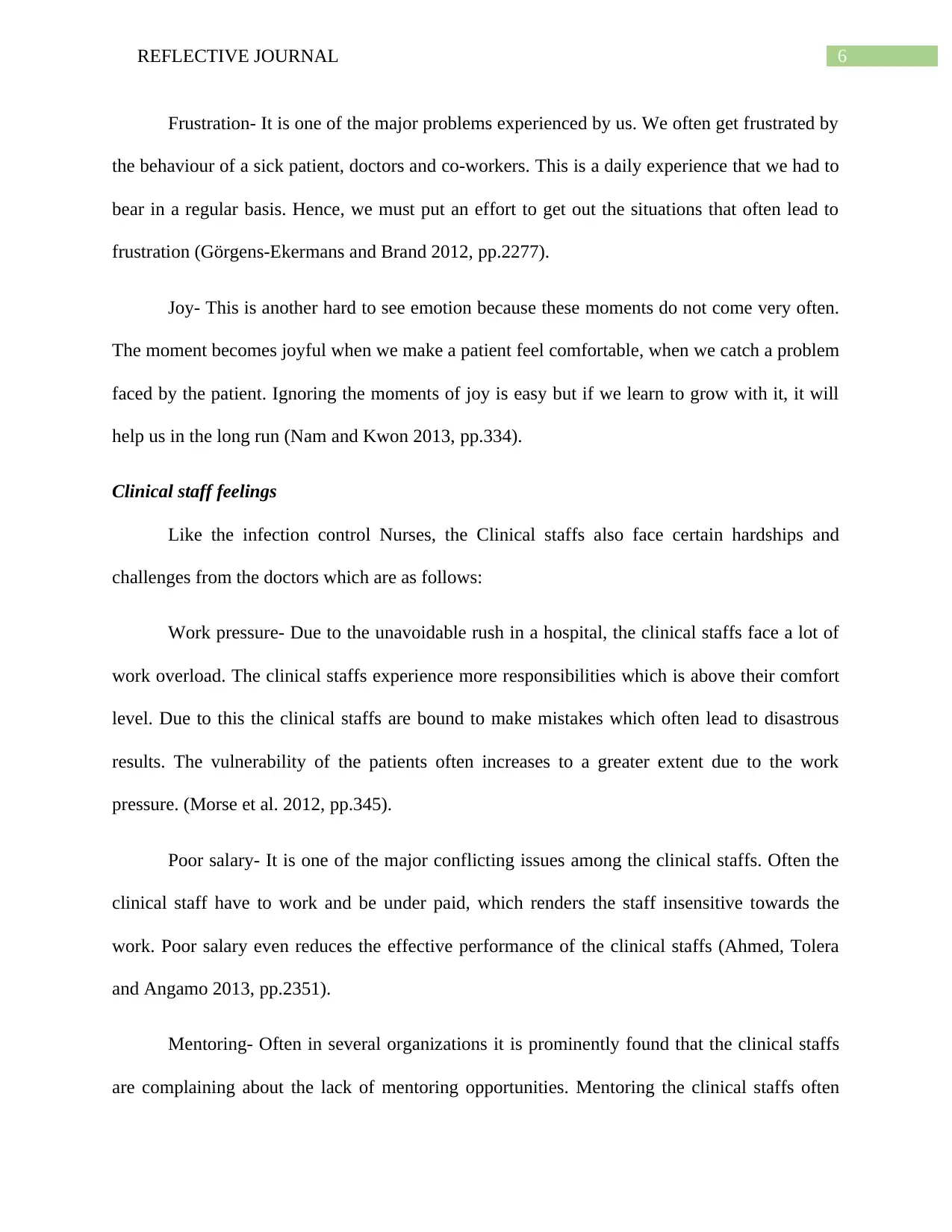
6REFLECTIVE JOURNAL
Frustration- It is one of the major problems experienced by us. We often get frustrated by
the behaviour of a sick patient, doctors and co-workers. This is a daily experience that we had to
bear in a regular basis. Hence, we must put an effort to get out the situations that often lead to
frustration (Görgens‐Ekermans and Brand 2012, pp.2277).
Joy- This is another hard to see emotion because these moments do not come very often.
The moment becomes joyful when we make a patient feel comfortable, when we catch a problem
faced by the patient. Ignoring the moments of joy is easy but if we learn to grow with it, it will
help us in the long run (Nam and Kwon 2013, pp.334).
Clinical staff feelings
Like the infection control Nurses, the Clinical staffs also face certain hardships and
challenges from the doctors which are as follows:
Work pressure- Due to the unavoidable rush in a hospital, the clinical staffs face a lot of
work overload. The clinical staffs experience more responsibilities which is above their comfort
level. Due to this the clinical staffs are bound to make mistakes which often lead to disastrous
results. The vulnerability of the patients often increases to a greater extent due to the work
pressure. (Morse et al. 2012, pp.345).
Poor salary- It is one of the major conflicting issues among the clinical staffs. Often the
clinical staff have to work and be under paid, which renders the staff insensitive towards the
work. Poor salary even reduces the effective performance of the clinical staffs (Ahmed, Tolera
and Angamo 2013, pp.2351).
Mentoring- Often in several organizations it is prominently found that the clinical staffs
are complaining about the lack of mentoring opportunities. Mentoring the clinical staffs often
Frustration- It is one of the major problems experienced by us. We often get frustrated by
the behaviour of a sick patient, doctors and co-workers. This is a daily experience that we had to
bear in a regular basis. Hence, we must put an effort to get out the situations that often lead to
frustration (Görgens‐Ekermans and Brand 2012, pp.2277).
Joy- This is another hard to see emotion because these moments do not come very often.
The moment becomes joyful when we make a patient feel comfortable, when we catch a problem
faced by the patient. Ignoring the moments of joy is easy but if we learn to grow with it, it will
help us in the long run (Nam and Kwon 2013, pp.334).
Clinical staff feelings
Like the infection control Nurses, the Clinical staffs also face certain hardships and
challenges from the doctors which are as follows:
Work pressure- Due to the unavoidable rush in a hospital, the clinical staffs face a lot of
work overload. The clinical staffs experience more responsibilities which is above their comfort
level. Due to this the clinical staffs are bound to make mistakes which often lead to disastrous
results. The vulnerability of the patients often increases to a greater extent due to the work
pressure. (Morse et al. 2012, pp.345).
Poor salary- It is one of the major conflicting issues among the clinical staffs. Often the
clinical staff have to work and be under paid, which renders the staff insensitive towards the
work. Poor salary even reduces the effective performance of the clinical staffs (Ahmed, Tolera
and Angamo 2013, pp.2351).
Mentoring- Often in several organizations it is prominently found that the clinical staffs
are complaining about the lack of mentoring opportunities. Mentoring the clinical staffs often
Paraphrase This Document
Need a fresh take? Get an instant paraphrase of this document with our AI Paraphraser
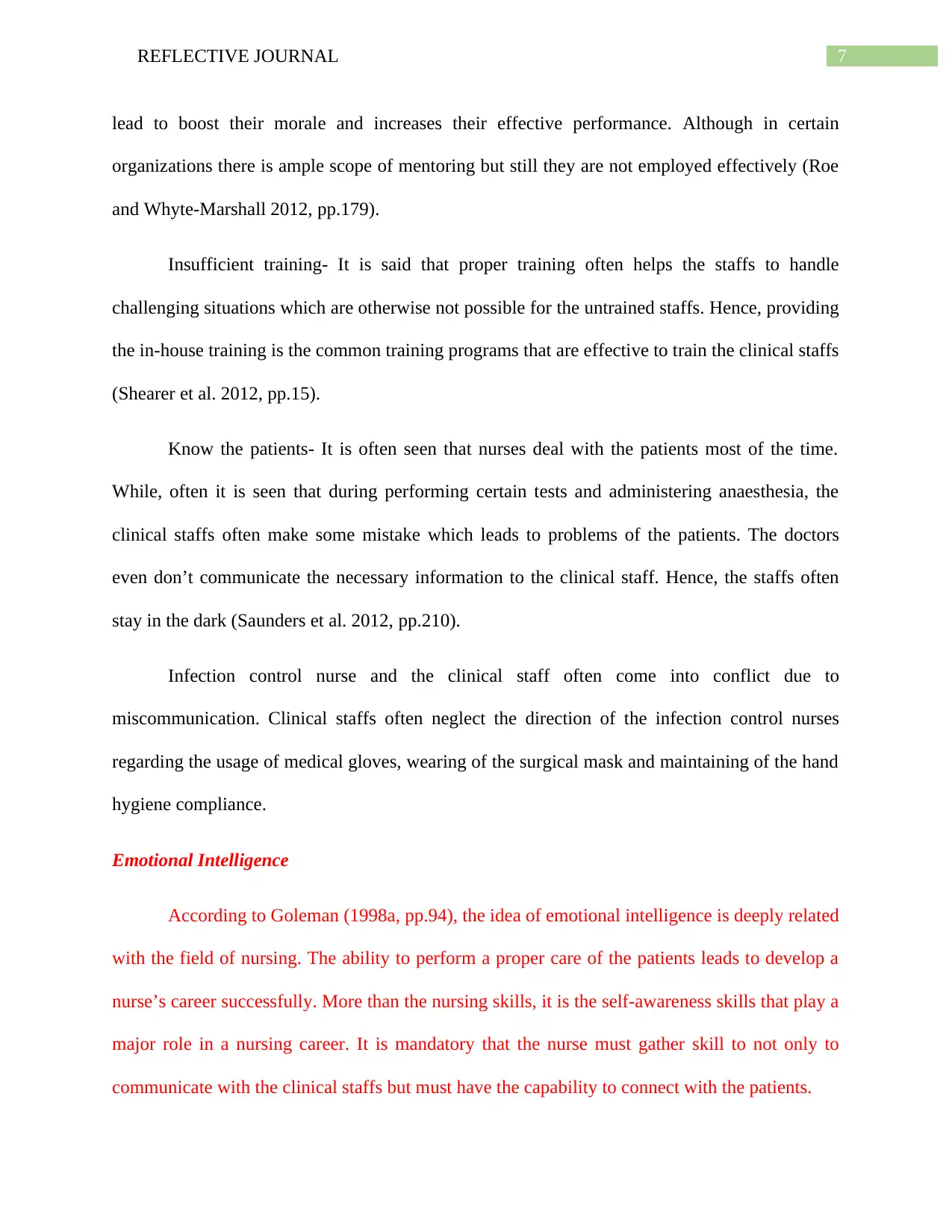
7REFLECTIVE JOURNAL
lead to boost their morale and increases their effective performance. Although in certain
organizations there is ample scope of mentoring but still they are not employed effectively (Roe
and Whyte-Marshall 2012, pp.179).
Insufficient training- It is said that proper training often helps the staffs to handle
challenging situations which are otherwise not possible for the untrained staffs. Hence, providing
the in-house training is the common training programs that are effective to train the clinical staffs
(Shearer et al. 2012, pp.15).
Know the patients- It is often seen that nurses deal with the patients most of the time.
While, often it is seen that during performing certain tests and administering anaesthesia, the
clinical staffs often make some mistake which leads to problems of the patients. The doctors
even don’t communicate the necessary information to the clinical staff. Hence, the staffs often
stay in the dark (Saunders et al. 2012, pp.210).
Infection control nurse and the clinical staff often come into conflict due to
miscommunication. Clinical staffs often neglect the direction of the infection control nurses
regarding the usage of medical gloves, wearing of the surgical mask and maintaining of the hand
hygiene compliance.
Emotional Intelligence
According to Goleman (1998a, pp.94), the idea of emotional intelligence is deeply related
with the field of nursing. The ability to perform a proper care of the patients leads to develop a
nurse’s career successfully. More than the nursing skills, it is the self-awareness skills that play a
major role in a nursing career. It is mandatory that the nurse must gather skill to not only to
communicate with the clinical staffs but must have the capability to connect with the patients.
lead to boost their morale and increases their effective performance. Although in certain
organizations there is ample scope of mentoring but still they are not employed effectively (Roe
and Whyte-Marshall 2012, pp.179).
Insufficient training- It is said that proper training often helps the staffs to handle
challenging situations which are otherwise not possible for the untrained staffs. Hence, providing
the in-house training is the common training programs that are effective to train the clinical staffs
(Shearer et al. 2012, pp.15).
Know the patients- It is often seen that nurses deal with the patients most of the time.
While, often it is seen that during performing certain tests and administering anaesthesia, the
clinical staffs often make some mistake which leads to problems of the patients. The doctors
even don’t communicate the necessary information to the clinical staff. Hence, the staffs often
stay in the dark (Saunders et al. 2012, pp.210).
Infection control nurse and the clinical staff often come into conflict due to
miscommunication. Clinical staffs often neglect the direction of the infection control nurses
regarding the usage of medical gloves, wearing of the surgical mask and maintaining of the hand
hygiene compliance.
Emotional Intelligence
According to Goleman (1998a, pp.94), the idea of emotional intelligence is deeply related
with the field of nursing. The ability to perform a proper care of the patients leads to develop a
nurse’s career successfully. More than the nursing skills, it is the self-awareness skills that play a
major role in a nursing career. It is mandatory that the nurse must gather skill to not only to
communicate with the clinical staffs but must have the capability to connect with the patients.
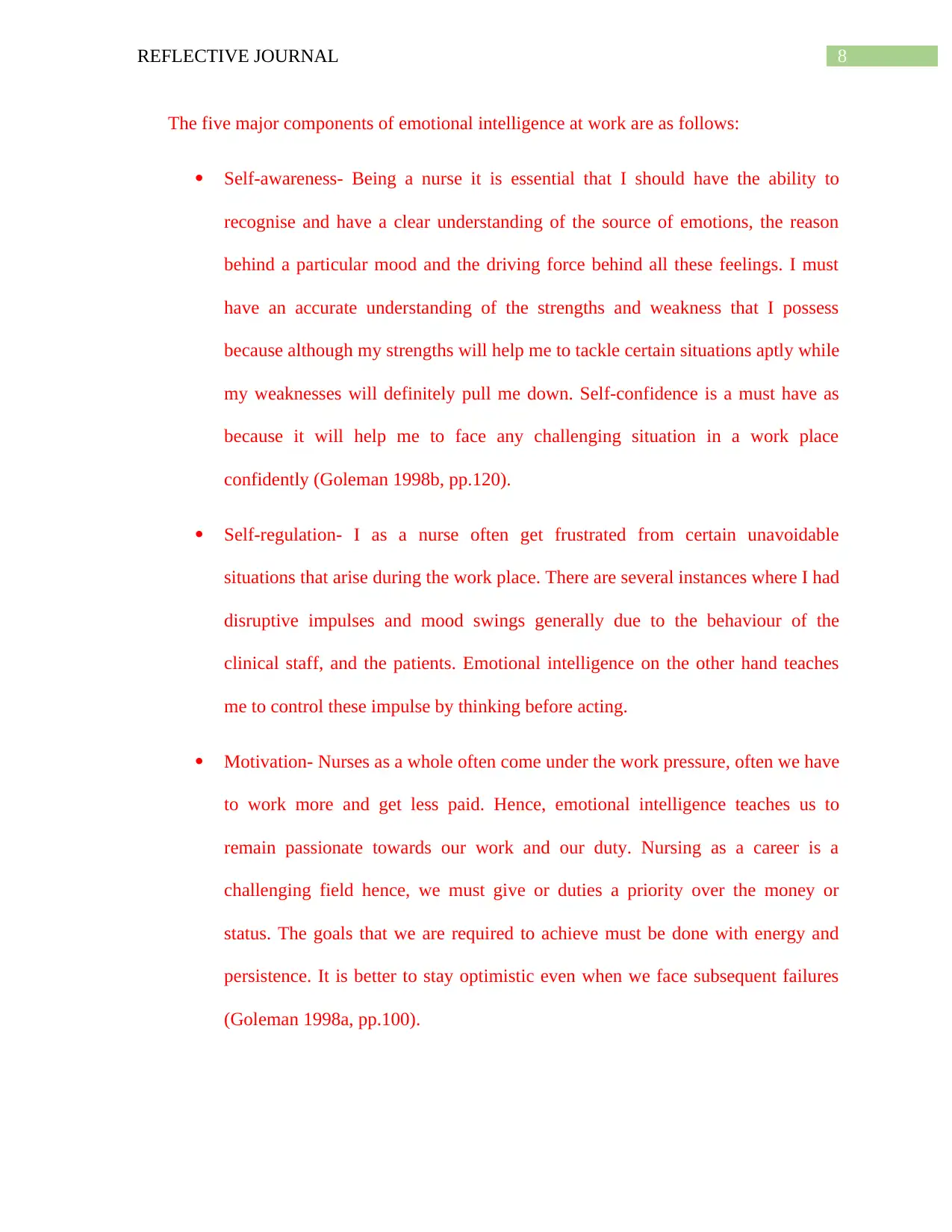
8REFLECTIVE JOURNAL
The five major components of emotional intelligence at work are as follows:
Self-awareness- Being a nurse it is essential that I should have the ability to
recognise and have a clear understanding of the source of emotions, the reason
behind a particular mood and the driving force behind all these feelings. I must
have an accurate understanding of the strengths and weakness that I possess
because although my strengths will help me to tackle certain situations aptly while
my weaknesses will definitely pull me down. Self-confidence is a must have as
because it will help me to face any challenging situation in a work place
confidently (Goleman 1998b, pp.120).
Self-regulation- I as a nurse often get frustrated from certain unavoidable
situations that arise during the work place. There are several instances where I had
disruptive impulses and mood swings generally due to the behaviour of the
clinical staff, and the patients. Emotional intelligence on the other hand teaches
me to control these impulse by thinking before acting.
Motivation- Nurses as a whole often come under the work pressure, often we have
to work more and get less paid. Hence, emotional intelligence teaches us to
remain passionate towards our work and our duty. Nursing as a career is a
challenging field hence, we must give or duties a priority over the money or
status. The goals that we are required to achieve must be done with energy and
persistence. It is better to stay optimistic even when we face subsequent failures
(Goleman 1998a, pp.100).
The five major components of emotional intelligence at work are as follows:
Self-awareness- Being a nurse it is essential that I should have the ability to
recognise and have a clear understanding of the source of emotions, the reason
behind a particular mood and the driving force behind all these feelings. I must
have an accurate understanding of the strengths and weakness that I possess
because although my strengths will help me to tackle certain situations aptly while
my weaknesses will definitely pull me down. Self-confidence is a must have as
because it will help me to face any challenging situation in a work place
confidently (Goleman 1998b, pp.120).
Self-regulation- I as a nurse often get frustrated from certain unavoidable
situations that arise during the work place. There are several instances where I had
disruptive impulses and mood swings generally due to the behaviour of the
clinical staff, and the patients. Emotional intelligence on the other hand teaches
me to control these impulse by thinking before acting.
Motivation- Nurses as a whole often come under the work pressure, often we have
to work more and get less paid. Hence, emotional intelligence teaches us to
remain passionate towards our work and our duty. Nursing as a career is a
challenging field hence, we must give or duties a priority over the money or
status. The goals that we are required to achieve must be done with energy and
persistence. It is better to stay optimistic even when we face subsequent failures
(Goleman 1998a, pp.100).
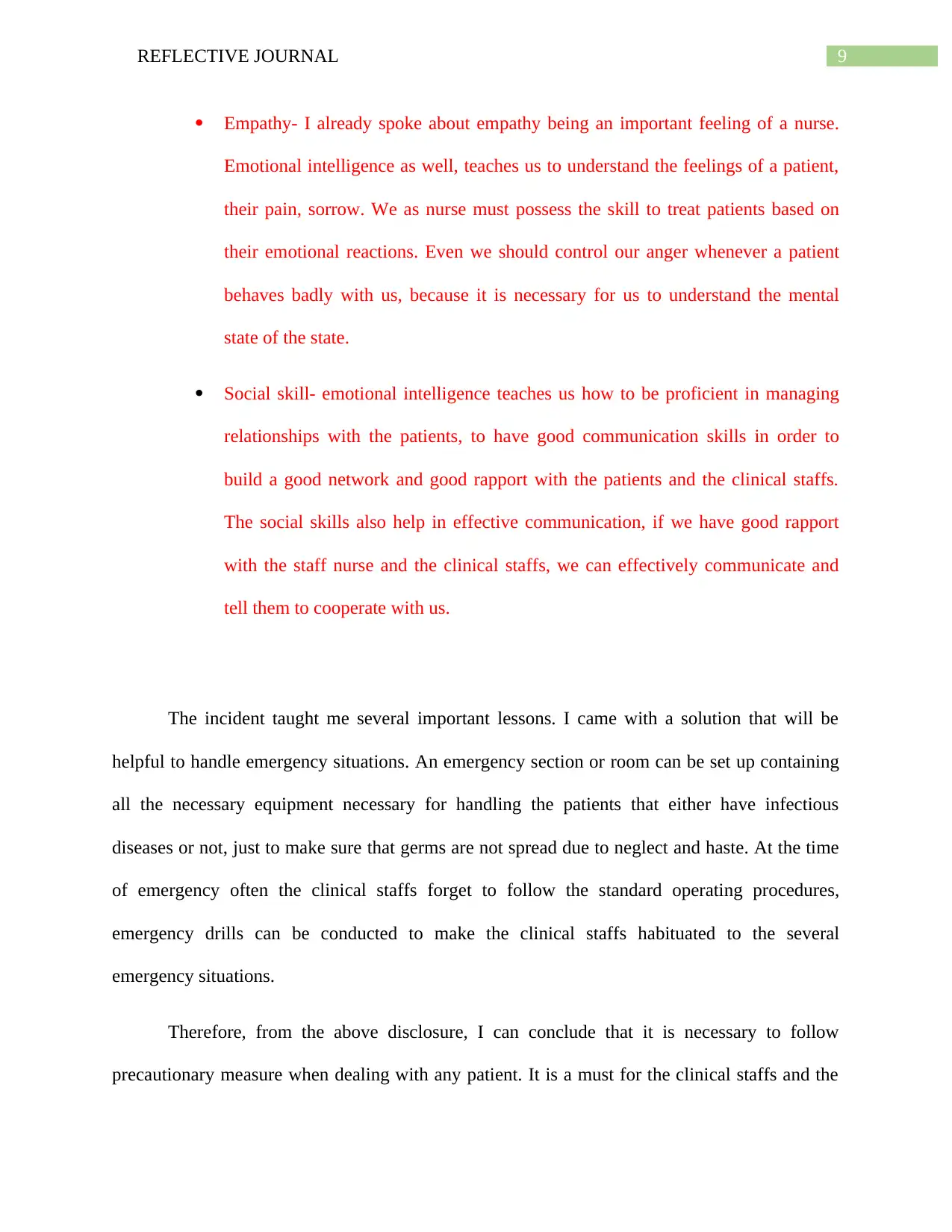
9REFLECTIVE JOURNAL
Empathy- I already spoke about empathy being an important feeling of a nurse.
Emotional intelligence as well, teaches us to understand the feelings of a patient,
their pain, sorrow. We as nurse must possess the skill to treat patients based on
their emotional reactions. Even we should control our anger whenever a patient
behaves badly with us, because it is necessary for us to understand the mental
state of the state.
Social skill- emotional intelligence teaches us how to be proficient in managing
relationships with the patients, to have good communication skills in order to
build a good network and good rapport with the patients and the clinical staffs.
The social skills also help in effective communication, if we have good rapport
with the staff nurse and the clinical staffs, we can effectively communicate and
tell them to cooperate with us.
The incident taught me several important lessons. I came with a solution that will be
helpful to handle emergency situations. An emergency section or room can be set up containing
all the necessary equipment necessary for handling the patients that either have infectious
diseases or not, just to make sure that germs are not spread due to neglect and haste. At the time
of emergency often the clinical staffs forget to follow the standard operating procedures,
emergency drills can be conducted to make the clinical staffs habituated to the several
emergency situations.
Therefore, from the above disclosure, I can conclude that it is necessary to follow
precautionary measure when dealing with any patient. It is a must for the clinical staffs and the
Empathy- I already spoke about empathy being an important feeling of a nurse.
Emotional intelligence as well, teaches us to understand the feelings of a patient,
their pain, sorrow. We as nurse must possess the skill to treat patients based on
their emotional reactions. Even we should control our anger whenever a patient
behaves badly with us, because it is necessary for us to understand the mental
state of the state.
Social skill- emotional intelligence teaches us how to be proficient in managing
relationships with the patients, to have good communication skills in order to
build a good network and good rapport with the patients and the clinical staffs.
The social skills also help in effective communication, if we have good rapport
with the staff nurse and the clinical staffs, we can effectively communicate and
tell them to cooperate with us.
The incident taught me several important lessons. I came with a solution that will be
helpful to handle emergency situations. An emergency section or room can be set up containing
all the necessary equipment necessary for handling the patients that either have infectious
diseases or not, just to make sure that germs are not spread due to neglect and haste. At the time
of emergency often the clinical staffs forget to follow the standard operating procedures,
emergency drills can be conducted to make the clinical staffs habituated to the several
emergency situations.
Therefore, from the above disclosure, I can conclude that it is necessary to follow
precautionary measure when dealing with any patient. It is a must for the clinical staffs and the
Secure Best Marks with AI Grader
Need help grading? Try our AI Grader for instant feedback on your assignments.
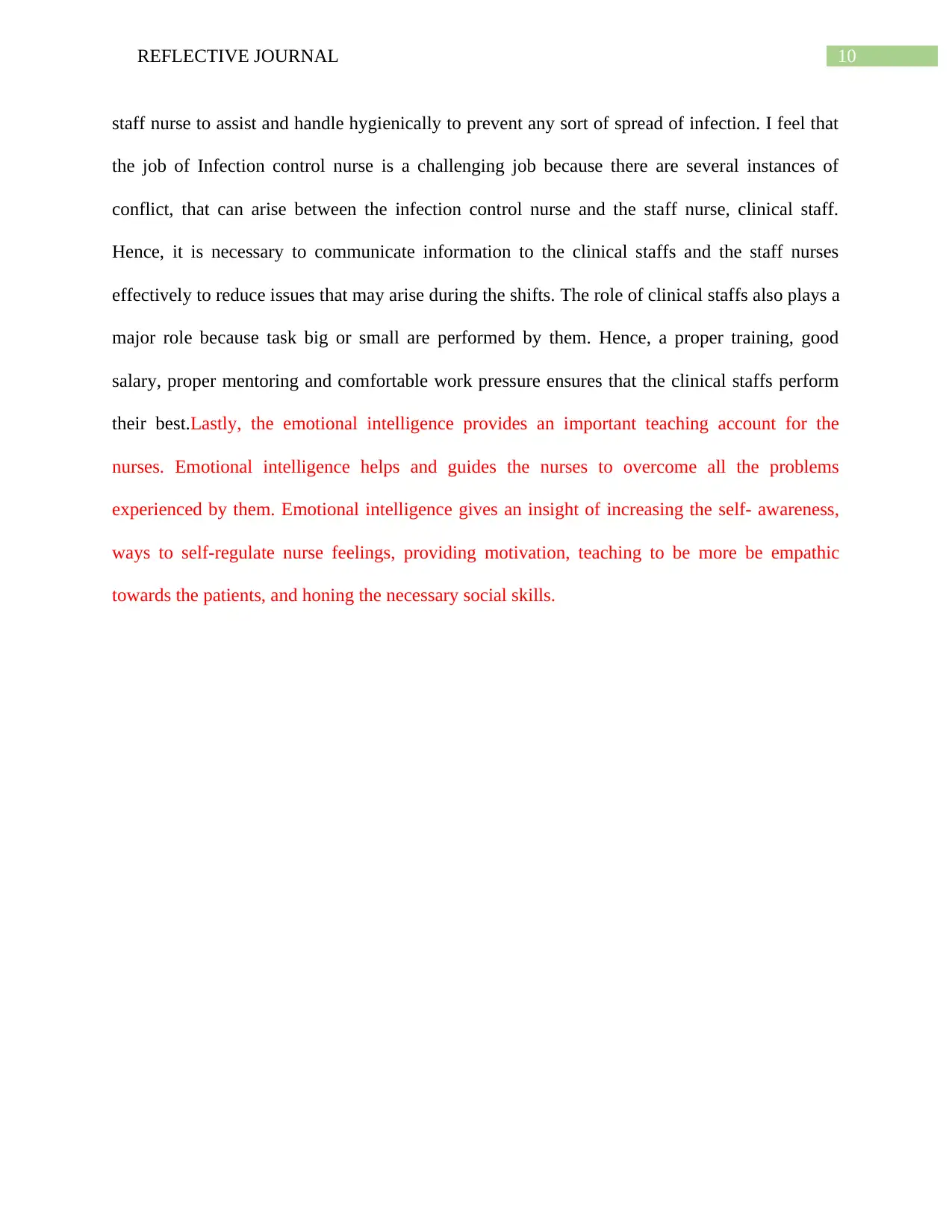
10REFLECTIVE JOURNAL
staff nurse to assist and handle hygienically to prevent any sort of spread of infection. I feel that
the job of Infection control nurse is a challenging job because there are several instances of
conflict, that can arise between the infection control nurse and the staff nurse, clinical staff.
Hence, it is necessary to communicate information to the clinical staffs and the staff nurses
effectively to reduce issues that may arise during the shifts. The role of clinical staffs also plays a
major role because task big or small are performed by them. Hence, a proper training, good
salary, proper mentoring and comfortable work pressure ensures that the clinical staffs perform
their best.Lastly, the emotional intelligence provides an important teaching account for the
nurses. Emotional intelligence helps and guides the nurses to overcome all the problems
experienced by them. Emotional intelligence gives an insight of increasing the self- awareness,
ways to self-regulate nurse feelings, providing motivation, teaching to be more be empathic
towards the patients, and honing the necessary social skills.
staff nurse to assist and handle hygienically to prevent any sort of spread of infection. I feel that
the job of Infection control nurse is a challenging job because there are several instances of
conflict, that can arise between the infection control nurse and the staff nurse, clinical staff.
Hence, it is necessary to communicate information to the clinical staffs and the staff nurses
effectively to reduce issues that may arise during the shifts. The role of clinical staffs also plays a
major role because task big or small are performed by them. Hence, a proper training, good
salary, proper mentoring and comfortable work pressure ensures that the clinical staffs perform
their best.Lastly, the emotional intelligence provides an important teaching account for the
nurses. Emotional intelligence helps and guides the nurses to overcome all the problems
experienced by them. Emotional intelligence gives an insight of increasing the self- awareness,
ways to self-regulate nurse feelings, providing motivation, teaching to be more be empathic
towards the patients, and honing the necessary social skills.
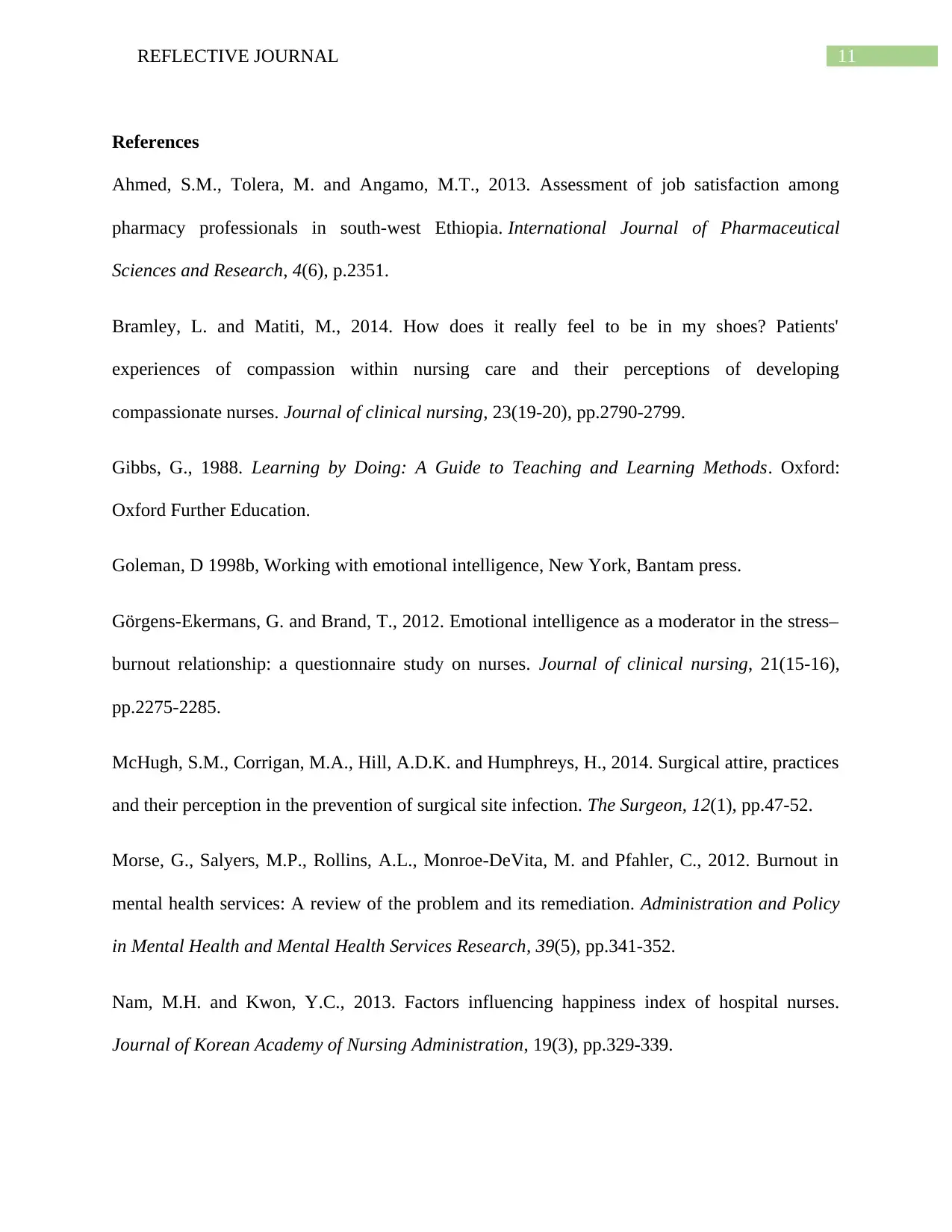
11REFLECTIVE JOURNAL
References
Ahmed, S.M., Tolera, M. and Angamo, M.T., 2013. Assessment of job satisfaction among
pharmacy professionals in south-west Ethiopia. International Journal of Pharmaceutical
Sciences and Research, 4(6), p.2351.
Bramley, L. and Matiti, M., 2014. How does it really feel to be in my shoes? Patients'
experiences of compassion within nursing care and their perceptions of developing
compassionate nurses. Journal of clinical nursing, 23(19-20), pp.2790-2799.
Gibbs, G., 1988. Learning by Doing: A Guide to Teaching and Learning Methods. Oxford:
Oxford Further Education.
Goleman, D 1998b, Working with emotional intelligence, New York, Bantam press.
Görgens‐Ekermans, G. and Brand, T., 2012. Emotional intelligence as a moderator in the stress–
burnout relationship: a questionnaire study on nurses. Journal of clinical nursing, 21(15‐16),
pp.2275-2285.
McHugh, S.M., Corrigan, M.A., Hill, A.D.K. and Humphreys, H., 2014. Surgical attire, practices
and their perception in the prevention of surgical site infection. The Surgeon, 12(1), pp.47-52.
Morse, G., Salyers, M.P., Rollins, A.L., Monroe-DeVita, M. and Pfahler, C., 2012. Burnout in
mental health services: A review of the problem and its remediation. Administration and Policy
in Mental Health and Mental Health Services Research, 39(5), pp.341-352.
Nam, M.H. and Kwon, Y.C., 2013. Factors influencing happiness index of hospital nurses.
Journal of Korean Academy of Nursing Administration, 19(3), pp.329-339.
References
Ahmed, S.M., Tolera, M. and Angamo, M.T., 2013. Assessment of job satisfaction among
pharmacy professionals in south-west Ethiopia. International Journal of Pharmaceutical
Sciences and Research, 4(6), p.2351.
Bramley, L. and Matiti, M., 2014. How does it really feel to be in my shoes? Patients'
experiences of compassion within nursing care and their perceptions of developing
compassionate nurses. Journal of clinical nursing, 23(19-20), pp.2790-2799.
Gibbs, G., 1988. Learning by Doing: A Guide to Teaching and Learning Methods. Oxford:
Oxford Further Education.
Goleman, D 1998b, Working with emotional intelligence, New York, Bantam press.
Görgens‐Ekermans, G. and Brand, T., 2012. Emotional intelligence as a moderator in the stress–
burnout relationship: a questionnaire study on nurses. Journal of clinical nursing, 21(15‐16),
pp.2275-2285.
McHugh, S.M., Corrigan, M.A., Hill, A.D.K. and Humphreys, H., 2014. Surgical attire, practices
and their perception in the prevention of surgical site infection. The Surgeon, 12(1), pp.47-52.
Morse, G., Salyers, M.P., Rollins, A.L., Monroe-DeVita, M. and Pfahler, C., 2012. Burnout in
mental health services: A review of the problem and its remediation. Administration and Policy
in Mental Health and Mental Health Services Research, 39(5), pp.341-352.
Nam, M.H. and Kwon, Y.C., 2013. Factors influencing happiness index of hospital nurses.
Journal of Korean Academy of Nursing Administration, 19(3), pp.329-339.
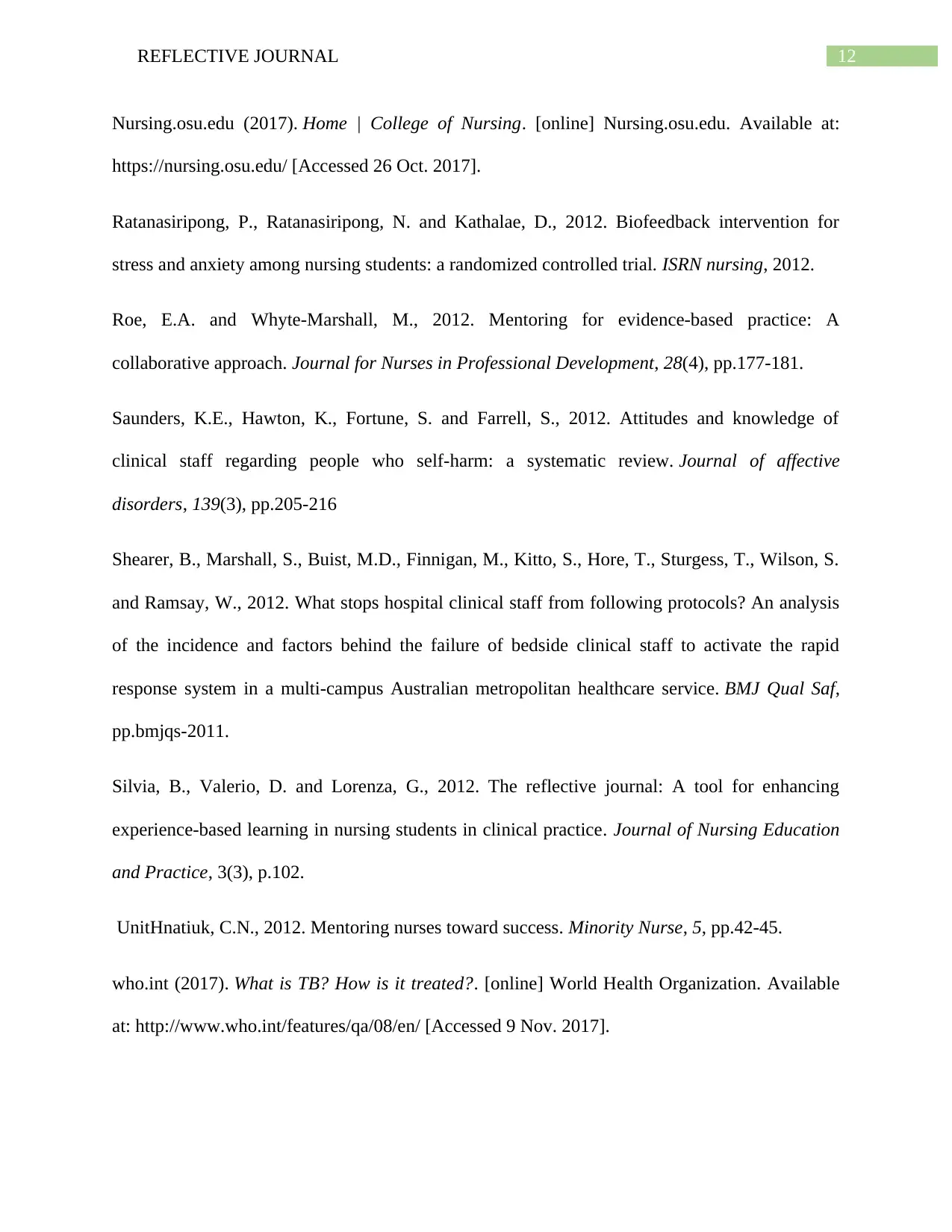
12REFLECTIVE JOURNAL
Nursing.osu.edu (2017). Home | College of Nursing. [online] Nursing.osu.edu. Available at:
https://nursing.osu.edu/ [Accessed 26 Oct. 2017].
Ratanasiripong, P., Ratanasiripong, N. and Kathalae, D., 2012. Biofeedback intervention for
stress and anxiety among nursing students: a randomized controlled trial. ISRN nursing, 2012.
Roe, E.A. and Whyte-Marshall, M., 2012. Mentoring for evidence-based practice: A
collaborative approach. Journal for Nurses in Professional Development, 28(4), pp.177-181.
Saunders, K.E., Hawton, K., Fortune, S. and Farrell, S., 2012. Attitudes and knowledge of
clinical staff regarding people who self-harm: a systematic review. Journal of affective
disorders, 139(3), pp.205-216
Shearer, B., Marshall, S., Buist, M.D., Finnigan, M., Kitto, S., Hore, T., Sturgess, T., Wilson, S.
and Ramsay, W., 2012. What stops hospital clinical staff from following protocols? An analysis
of the incidence and factors behind the failure of bedside clinical staff to activate the rapid
response system in a multi-campus Australian metropolitan healthcare service. BMJ Qual Saf,
pp.bmjqs-2011.
Silvia, B., Valerio, D. and Lorenza, G., 2012. The reflective journal: A tool for enhancing
experience-based learning in nursing students in clinical practice. Journal of Nursing Education
and Practice, 3(3), p.102.
UnitHnatiuk, C.N., 2012. Mentoring nurses toward success. Minority Nurse, 5, pp.42-45.
who.int (2017). What is TB? How is it treated?. [online] World Health Organization. Available
at: http://www.who.int/features/qa/08/en/ [Accessed 9 Nov. 2017].
Nursing.osu.edu (2017). Home | College of Nursing. [online] Nursing.osu.edu. Available at:
https://nursing.osu.edu/ [Accessed 26 Oct. 2017].
Ratanasiripong, P., Ratanasiripong, N. and Kathalae, D., 2012. Biofeedback intervention for
stress and anxiety among nursing students: a randomized controlled trial. ISRN nursing, 2012.
Roe, E.A. and Whyte-Marshall, M., 2012. Mentoring for evidence-based practice: A
collaborative approach. Journal for Nurses in Professional Development, 28(4), pp.177-181.
Saunders, K.E., Hawton, K., Fortune, S. and Farrell, S., 2012. Attitudes and knowledge of
clinical staff regarding people who self-harm: a systematic review. Journal of affective
disorders, 139(3), pp.205-216
Shearer, B., Marshall, S., Buist, M.D., Finnigan, M., Kitto, S., Hore, T., Sturgess, T., Wilson, S.
and Ramsay, W., 2012. What stops hospital clinical staff from following protocols? An analysis
of the incidence and factors behind the failure of bedside clinical staff to activate the rapid
response system in a multi-campus Australian metropolitan healthcare service. BMJ Qual Saf,
pp.bmjqs-2011.
Silvia, B., Valerio, D. and Lorenza, G., 2012. The reflective journal: A tool for enhancing
experience-based learning in nursing students in clinical practice. Journal of Nursing Education
and Practice, 3(3), p.102.
UnitHnatiuk, C.N., 2012. Mentoring nurses toward success. Minority Nurse, 5, pp.42-45.
who.int (2017). What is TB? How is it treated?. [online] World Health Organization. Available
at: http://www.who.int/features/qa/08/en/ [Accessed 9 Nov. 2017].
1 out of 13
Related Documents
Your All-in-One AI-Powered Toolkit for Academic Success.
+13062052269
info@desklib.com
Available 24*7 on WhatsApp / Email
![[object Object]](/_next/static/media/star-bottom.7253800d.svg)
Unlock your academic potential
© 2024 | Zucol Services PVT LTD | All rights reserved.





